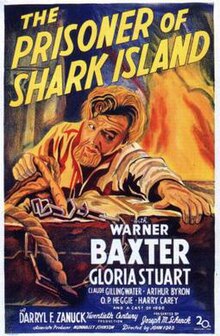|
The Prisoner of Shark Island
The Prisoner of Shark Island is a 1936 American drama film that presents a highly whitewashed and fictionalized life of Maryland physician Samuel Mudd, who treated the injured presidential assassin John Wilkes Booth and later spent time in prison after his unanimous conviction for being one of Booth's accomplices. The film was produced by Darryl F. Zanuck, was directed by John Ford and starred Warner Baxter and Gloria Stuart. The film portrays Dr. Mudd as an innocent man, while the historical record shows Mudd sheltered Booth and another conspirator in the Lincoln Assassination, David Herold, and assisted them in their flight from Washington after learning Booth had assassinated President Lincoln, making Mudd an accomplice after the fact. Unlike the film narrative, in real life Dr. Mudd had been part of an earlier conspiracy to kidnap President Lincoln and exchange him for Confederate prisoners, which constitutes treason. Twentieth Century Pictures, before it merged with Fox, purchased the rights to the book The Life of Dr. Mudd by Nettie Mudd Monroe, the doctor's daughter. The film's credits, however, make no reference to Monroe or her book. Modern sources state that Darryl F. Zanuck, Twentieth Century's vice-president in charge of production, got the idea to make the film after he read an article in Time magazine about the prison camp for political prisoners on the Dry Tortugas island.[1] PlotA few hours after the assassination of President Abraham Lincoln (Frank McGlynn Sr.), Dr. Samuel Mudd (Warner Baxter) gives treatment to a man with a broken leg who shows up at his door. Mudd does not know that the president has been assassinated, and also does not know the man he is treating is Lincoln's assassin, John Wilkes Booth. Mudd splints the broken leg and receives a banknote as payment, only later realizing that it is a $50 bill. Mudd is soon afterward arrested for being an accessory in the assassination, is convicted, and is then sent to Arcadia, a prison on the Dry Tortugas that is referred to in the film as "America's own Devil's Island". Mudd's wife hatches an escape plan using "Buck", the black prison guard who tends to Mudd. Mudd escapes his cell, hears Sgt. Rankin's instruction to kill him on sight, and gets to the prison's outer wall above the shark-infested moat before an alarm is sounded. Mudd then swims to a waiting boat where his wife and her father (Mr. Holt) help him. However, Sgt. Rankin boards the boat, recaptures Mudd and returns him to the prison, where he is confined to a windowless, underground cell along with "Buck". The island has been in the grip of a yellow fever epidemic, with the official prison doctor having fallen ill with the same fever. The Commandant has few options and places Mudd in charge of addressing the outbreak. Now with the cooperation of the soldier guards, Mudd introduces ventilation into the hospital ward by smashing the windows and letting in a storm which relieves the men's suffering by cooling the air and “blowing all the mosquitoes away.” (The references to the mosquitoes speaks to most, if not all, of the film 's audience, who would know that yellow fever is carried by mosquitoes.) The yellow fever epidemic subsides and Mudd ironically saves the life of Sgt. Rankin, but not before Mudd also catches the fever. The soldiers sign a petition to have Mudd pardoned and he is ultimately released. Cast
Critical responseA contemporary review by Frank Nugent in The New York Times reported that the film presents Mudd's story "with commendable directness," noting "Warner Baxter's entirely convincing portrayal of Dr. Mudd" but also claiming that the film "is scarcely more than a well-fabricated edition of the Dreyfus-Devil's Island series that has become part of the screen's tradition."[2] Variety reported that "Warner Baxter [...] turns in a capital performance as the titular prisoner of ‘America’s Devil’s Island’", and described the casting as "tiptop", with "John Carradine stand[ing] out as a new face among especially sinister heavies."[3] Writing in Turner Classic Movies, critic Jeremy Arnold described the film as a "highly entertaining, fast-moving film with endlessly fascinating subject matter," being "one of director John Ford's less-talked-about pictures" and noting that "John Carradine [...] is deliciously evil and nasty in one of the most memorable performances of his career [and] Warner Baxter as Mudd gives perhaps THE best performance of his own career."[4] References
Further reading
External links
|
||||||||||||||||||||||||||||||
